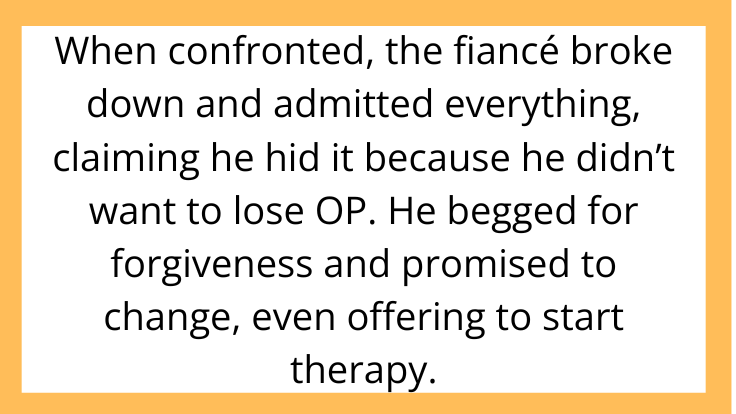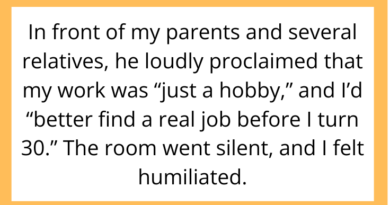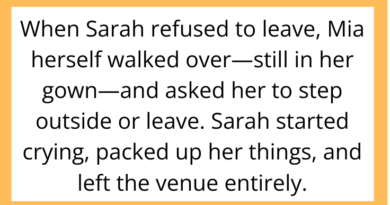AITAH for Wanting to Cancel My Wedding After Discovering My Fiancé Hid His Gambling Addiction?
Weddings are supposed to be joyful milestones—but what happens when a devastating secret surfaces just before the big day? A recent AITAH post stirred the internet with this very dilemma: should someone go through with a wedding if their partner hides something serious, like a gambling addiction?
In this post, we explore the emotional chaos, the ethics of calling off a wedding, and what it means to protect your future, even when love is involved.
The Scenario: A Shocking Discovery Before “I Do”

The original poster (OP) shared that only three weeks before their wedding, they accidentally discovered their fiancé had been hiding a serious gambling problem. Over the past two years, he had secretly racked up nearly $30,000 in debt—money borrowed from friends, credit cards, and even payday loans.
When confronted, the fiancé broke down and admitted everything, claiming he hid it because he didn’t want to lose OP. He begged for forgiveness and promised to change, even offering to start therapy.
But OP felt blindsided. Not only had their trust been broken, but they were now questioning whether they were about to commit to a life of financial instability, dishonesty, and emotional stress. So OP made the difficult choice: they called off the wedding.
The fallout was brutal. Family members accused OP of abandoning someone “in need.” Friends called them cold. The fiancé’s family begged them to reconsider. OP turned to Reddit asking: AITAH for walking away instead of standing by him?
When Secrets Shatter Trust

Trust is the foundation of any long-term relationship. Discovering a hidden addiction—especially just before marriage—can feel like emotional whiplash. While some believe love means unconditional support, others argue that honesty is non-negotiable, especially when building a life together.
In OP’s case, the concern wasn’t just the addiction, but the deception. Here’s why many Reddit users stood by OP:
-
Financial secrecy is serious: Hidden debt affects both partners and can destroy futures.
-
Timing matters: Learning this so close to the wedding raises red flags about commitment readiness.
-
Support ≠ sacrifice: You can love someone and still choose not to jeopardize your well-being.
Can You Be Compassionate and Still Say No?

One of the most emotionally complex parts of this situation is the guilt. OP expressed that they still loved their fiancé and didn’t want to leave him during a crisis—but they also felt that marrying someone who kept such a secret would be a betrayal of their own needs.
And this is where it gets real: setting a boundary isn’t heartless—it’s necessary.
Choosing to delay or cancel a wedding doesn’t make someone cold or unloving. It can actually be a courageous act of self-respect, especially when your partner’s decisions have long-term consequences for you too.
How to Handle a Pre-Wedding Dealbreaker

If you ever find yourself facing a life-changing revelation before your wedding, here’s what experts (and experience) suggest:
-
Pause, don’t rush: You don’t have to cancel everything immediately, but take time to evaluate honestly.
-
Seek outside support: Consider therapy or counseling—alone and together.
-
Clarify boundaries: Ask yourself what you can tolerate, and what crosses the line.
-
Listen to your gut: If you feel more fear than excitement, trust that feeling.
Postponing or canceling a wedding is never easy—but staying in a relationship out of guilt or fear can cause more long-term damage.
Internet’s Verdict: Mostly NTA

In the Reddit thread, thousands chimed in, and the overwhelming majority agreed: OP was not the ahole. Many applauded them for being strong enough to walk away rather than gamble (literally) on a relationship built on lies.
Some commenters, however, suggested that if the fiancé was genuinely seeking help and committed to recovery, postponement—not cancellation—might have been a middle ground. But even then, they acknowledged that the decision ultimately belonged to OP.
Final Thoughts: When Protecting Yourself Looks Like Betrayal

It’s tempting to label self-protection as selfishness, especially when others are hurting. But being honest about what you can and cannot handle isn’t cruelty—it’s clarity.
Walking away from a wedding doesn’t mean you don’t care. It means you understand that a healthy partnership requires more than love—it requires trust, honesty, and a shared commitment to stability.
If any of those pillars are missing, it’s okay to step back—even if everyone else thinks you’re wrong.



